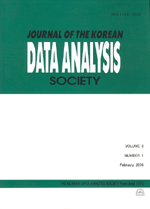협동학습의 상호의존성 구조와 신뢰 수준에 따른 대학생의 협동과 집단적 효능감 및 성과기대의 차이
Differences in University Students Cooperation, Collective Efficacy and Outcome Expectancy as a Function of Interdependence and Trust of Cooperative Learning
- 한국자료분석학회
- Journal of The Korean Data Analysis Society (JKDAS)
- Vol.9 No.1
-
2007.02371 - 383 (13 pages)
- 58

본 연구는 협동학습의 상호의존성 구조와 신뢰 수준에 따라 대학생의 협동, 집단적 효능감, 그리고 집단적 성과기대에 있어서 어떠한 차이가 있는가를 알아보고자 수행되었다. 연구대상은 대학생 186명이었고, 설문지(협동, 집단적 효능감, 집단적 성과 기대 척도 포함)를 통해 자료를 수집하였다. 수집된 자료는 이원변량분석 방법에 의해 분석되었으며, 연구결과는 다음과 같다. 첫째, 협동은 협동학습의 상호의존성 구조와 신뢰 수준에 따라 유의한 차이가 없는 것으로 나타났다. 둘째, 집단적 효능감은 협동학습의 신뢰 수준에서만 유의한 효과가 있는 것으로 나타났다. 셋째, 집단적 성과기대도 신뢰 수준에서만 유의한 효과가 있는 것으로 나타났다. 이러한 결과는 협동학습에서 신뢰 조건이 대학생의 집단적 효능감과 성과 기대와 밀접한 관계가 있음을 시사한다. 따라서 대학생의 효능감과 성과기대를 촉진하기 위해서는 협동학습 과정에서 구성원들 간에 신뢰를 형성시킬 수 기회가 제공되어야 한다.
Although cooperation has been considered in varied ways in different academic disciplines, many problems undermining collaboration involve worker interaction patterns and trust issues. To understand these issues empirically, this study examined one well-researched factor, group interdependence structure, and another one less-attended factor, trust. The study was to examine differences in university students cooperation, efficacy, and outcome expectancy as a function of differential interdependence structures and trust levels. The experimental design was 2(interdependency: positive and negative) 2(trust: high and low) factorial design. Four simulated scenarios(work group conditions) were generated to reflect each group characteristic in terms of interdependency and trust. The research sample of 186 undergraduate students was randomly assigned to one of four simulation cooperative learning group conditions. Subjects described the actual group situation similar to the assigned scenario. They then responded to a measure of cooperation, collective efficacy and outcome expectancy. The results showed that only the trust variable of cooperative learning significantly affected university students collective efficacy and outcome expectancy. This study suggest that instructors can proactively adopt the cooperative work(or team) performance system by promoting trust among students, instead of the traditional competitive grading system, and trust is a collective construct such that the development of a collective agency within a work group depends on the cognitively shared form of trust.
1. 서론
2. 이론적 배경
3. 연구방법
4. 연구결과
5. 논의 및 결론
참고문헌
(0)
(0)